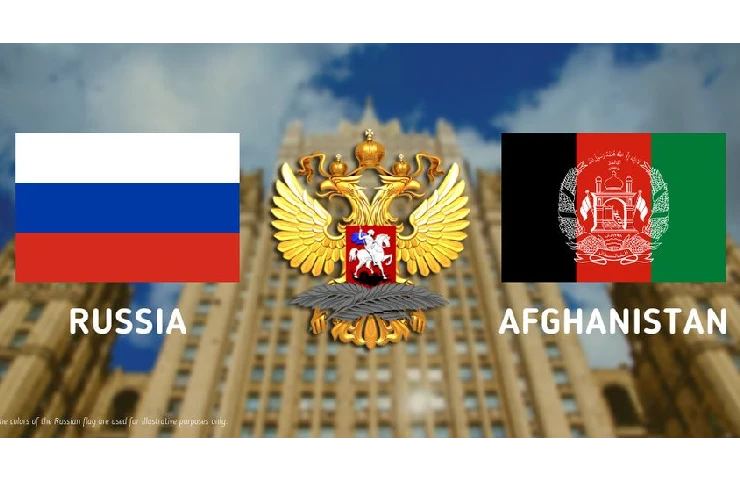

Russia has been hosting the Taliban for long (Photo: @mfa_russia)
<p>
The recent Moscow format of talks – the third so far – has, according to media reports, caused some dissatisfaction amongst Indian officials.&nbsp;</p>
<p>
The consultations in which India also participated alongside Russia, China, Pakistan, Iran, Kazakhstan, Kyrgyzstan, Turkmenistan and Uzbekistan, as well as a high-level delegation of the interim Afghan government, adopted a statement, which had a clause saying &quot;It was stated that further practical engagement with Afghanistan needed to take into account the new reality, that is the Taliban coming to power in the country, irrespective of the official recognition of the new Afghan government by the international community.&quot; It was this clause that is the cause of unease, which amounts to a de facto recognition of the Taliban rule in Afghanistan. What could have been different is a matter of speculation.&nbsp;</p>
<p>
India&#39;s disquiet, however, has a parallel: Russia&#39;s reluctance to accept Pakistan&#39;s control over the Afghan narrative. &quot;Russia does not want Pakistan to control the Taliban or events in Afghanistan,&quot; says Alexandr Dmitrievich Sobianin,&nbsp;Head of the Asian Cultural Military Centre of Moscow-based The Foundation for Eurasian Integration. The&nbsp;Moscow format talks are one way for Russia to exert control over its old play field. A major objective was to come to a &quot;regional consensus&quot; said Zamir Kabulov, President Putin&#39;s special envoy for Afghanistan and the main architect of Moscow&#39;s Afghan policy,&nbsp; at an online press conference. This regional consensus, however, is still elusive. While Uzbekistan, Turkmenistan, Kyrgyzstan and Kazakhstan are by and large on the same page with Russia regarding Taliban ruled Afghanistan, Tajikistan is not. Neither is India; even Iran is taking a more strident position given the attack on Shia Hazaras in Afghanistan and the well documented Pakistani hand in the fall of Panjshir province and the predominantly Tajik opposition.&nbsp;</p>
<p>
While Kabulov characteristically tried to downplay Taliban&#39;s attacks and regressive policies on women and girls, he did concede that the Taliban had to fulfil its &quot;responsibilities&quot; if it wanted &quot;recognition&quot;.&nbsp;</p>
<p>
The sense that the Taliban was not fulfilling its promise of change was reflected in the Moscow consultation statement which asked the Taliban &ldquo;to take further steps to improve governance and to form a truly inclusive government&quot; that reflected the &ldquo;interests of all major ethno-political forces in the country.&quot;</p>
<p>
Kabulov&#39;s optimism regarding the Taliban are, unfortunately, not shared by other Russian experts on Afghanistan. Andrei Nikolaevitch Serenko, a foremost Afghan expert, minces no words. Speaking at a roundtable he said the Taliban are Pakistan&#39;s proxy and not the nationalist Pashtun movement that Russian officials were trying to portray it as. A Taliban member not in sync with Rawalpindi would lose his life or would &quot;come around&quot; after chastisement pointing to the example of Mullah Baradar who served time in Pakistan&#39;s prisons. No key decision can be taken by the Taliban without Pakistan&#39;s endorsement, which has &quot;Islamised&quot; and &quot;Jihad-ised&quot;</p>
<p>
According to Serenko if there is no widespread violence and explosions in Afghanistan since the Taliban took it over its only because the latter has ceased to engage in such violence.&nbsp;</p>
<p>
Sobianin, concurs. The Taliban are neither anti-colonial nor do they represent Pashtun nationalism, he says. &quot;On the other hand, the National Resistance Front is becoming far more broad-based&quot;. According to Sobianin Pakistan cannot control the situation because it is not in a position to. Pakistan neither has the resources to stabilize Afghanistan economically, on the other hand it is beset with numerous internal problems&nbsp;of its own.</p>
<p>
Unfortunately for Pakistan, its imprints are all over the &quot;new Afghanistan&quot;. Faiz Hameed&#39;s photos with the Taliban leadership, the ascendence of the Haqqani network in Kabul, the infighting amongst the Taliban have left little to the imagination as to whose proxies have been thrust on Kabul.&nbsp;</p>
<p>
The Taliban&#39;s own policies have done little to assuage the nervousness of the international community: the closure of girl schools, the assaults on journalists, protestors, women (including beheading), the eulogization and mainstreaming of suicide bombers, the revenge killings, and so on. Added to that are credible reports of the many different jihadist groups inside Afghanistan, and the deployment of jihadists on the Tajik-Afghan border.&nbsp;</p>
<p>
And in spite of Russian official bonhomie and nonchalance with the Taliban, Moscow&#39;s continuous military drills and exercises in the bordering regions, the activation of its largest foreign military base in Tajikistan tell a tale of their own.&nbsp;</p>
<p>
<a href="https://www.indianarrative.com/opinion-news/is-kyrgyzstan-along-with-uzbekistan-following-a-policy-of-appeasement-by-engaging-with-the-taliban-118176.html">Is Kyrgyzstan along with Uzbekistan following a policy of &ldquo;appeasement&rdquo; by engaging with the Taliban?</a></p>
<p>
<a href="https://www.indianarrative.com/opinion-news/after-initial-euphoria-is-russia-changing-its-mind-on-the-taliban-114586.html">After initial euphoria, is Russia changing its mind on the Taliban?</a></p>
<p>
<em>(Aditi Bhaduri is a columnist specialising in Eurasian geopolitics. Views expressed are personal)</em></p>
Minister for Electronics and Information Technology Ashwini Vaishnaw said on Friday that the government is…
Renowned human rights activist and political analyst Amjad Ayub Mirza has expressed a strong denunciation…
As was widely expected, the Indian economy grew by 6.5 per cent in real terms…
World No Tobacco Day, marked annually on 31 May, addresses a major public health challenge--the…
Defence Minister Rajnath Singh, addressing officers and sailors onboard India's first indigenous aircraft carrier INS…
The leadership team from the Central Tibetan Administration (CTA) arrived in Tokyo to participate in…